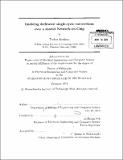Enabling dedicated single-cycle connections over a shared network-on-chip
Author(s)
Krishna, Tushar
DownloadFull printable version (29.52Mb)
Other Contributors
Massachusetts Institute of Technology. Department of Electrical Engineering and Computer Science.
Advisor
Li-Shiuan Peh.
Terms of use
Metadata
Show full item recordAbstract
Adding multiple processing cores on the same chip has become the de facto design choice as we continue extracting more and more performance/watt from our chips in every technology generation. In this context, the interconnect fabric connecting the cores starts gaining paramount importance. A high latency network can create performance bottlenecks and limit scalability. Thus conventional wisdom forces coherence protocol and software designers to develop techniques to optimize for locality and keep communication to the minimum. This dissertation challenges this conventional wisdom. We show that on-chip networks can be designed to provide extremely low-latencies while handling bursts of high-bandwidth traffic, thus reversing the trade-offs one typically associates with Private vs. Shared caches, or Broadcast vs. Directory protocols. The dissertation progressively builds a network-on-chip fabric that dynamically creates single-cycle network paths across multiple-hops, for both unicast and collective (1-to-Many and Many-to-1) communication flows. We start with a prototype chip demonstrating single-cycle per-hop traversals over a mesh network-on-chip. This design is then enhanced to support 1-to-Many (multicast) and Many-to-1 (acknowledgement) traffic flows by intelligent forking and aggregation respectively at network routers. Finally, we leverage clock-less repeated wires on the data-path and propose a dynamic cycle-by-cycle network reconfiguration methodology to provide single-cycle traversals across 9-11 hops at GHz frequencies. The network architectures proposed in this thesis provide performance that is within 12% of that provided by an idealized contention-free fully-connected single-cycle network. Going forward, we believe that the ideas proposed in this thesis can pave the way for locality-oblivious shared-memory design.
Description
Thesis: Ph. D., Massachusetts Institute of Technology, Department of Electrical Engineering and Computer Science, 2014. Cataloged from PDF version of thesis. Includes bibliographical references (pages 197-204).
Date issued
2014Department
Massachusetts Institute of Technology. Department of Electrical Engineering and Computer SciencePublisher
Massachusetts Institute of Technology
Keywords
Electrical Engineering and Computer Science.